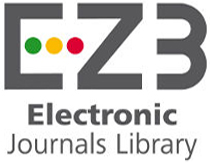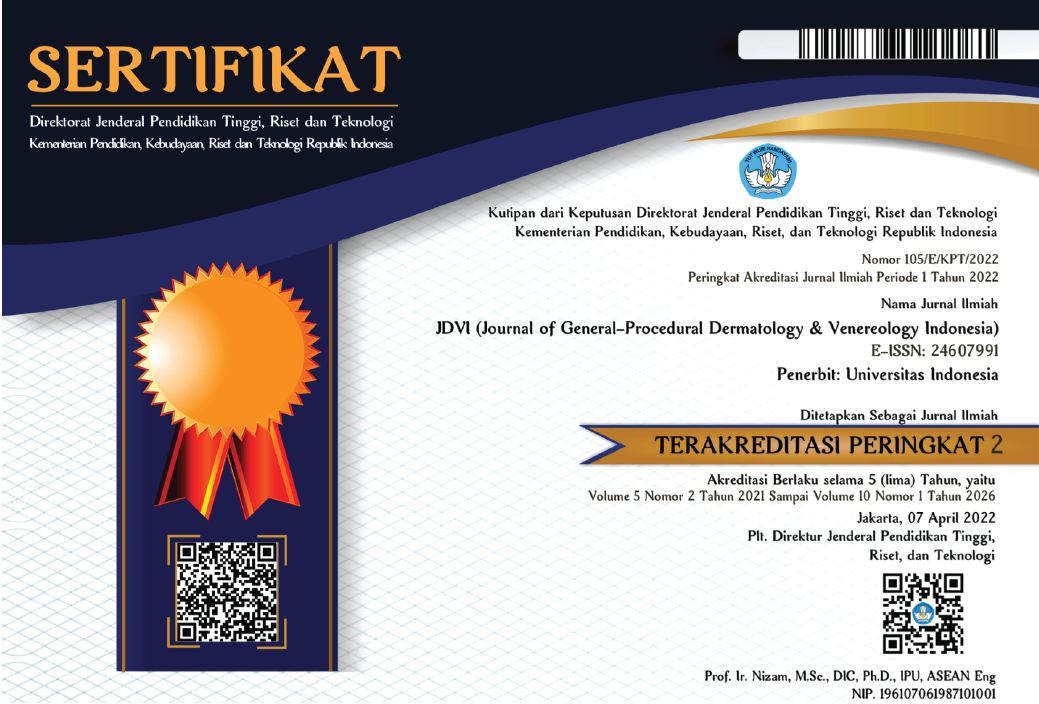Abstract
Background: Acne conglobata (AC) is a rare and severe acne characterized by interconnected nodules, cysts, and abscesses. Mesenchymal stem cell-derived exosomes (MSC-exosomes) have immunosuppressive properties that alleviate inflammation and immunological reactions. We present a case of AC in a patient who received topical administration of exosomes.
Case Illustration: A 20-year-old male was diagnosed with AC, presenting as inflammatory papules and cysts covered with yellowish crusts that had been present for five months. Exosomes (ASCE+®, Seoul, South Korea) were topically administered at a dose of 5 mL, applied evenly to the face. The patient underwent three treatment sessions, with a one-week interval between sessions. Photographic images were captured before treatment, immediately after the final session, followed by one week and then three weeks after the final treatment session. The patient expressed complete satisfaction with the implemented treatment and disclosed no adverse effects.
Discussion: The present case report illustrates the therapeutic advantages associated with the use of exosomes in a patient with AC. The therapeutic targeting of inflammatory regulators is crucial in treating AC. Studies have shown that MSCs possess inherent immunosuppressive properties that can help alleviate inflammation and immunological reactions. MSC-exosomes offer additional benefits, including angiogenic capacity and collagen synthesis. The study's limitations include the short follow-up duration and the lack of a control group.
Conclusion: Exosomes have the potential to serve as cosmeceutical in the treatment of AC, due to their anti-inflammatory, regenerative, and antimicrobial properties.
References
- Hafsi W, Arnold DL, Kassardjian M. Acne conglobata. StatPearls [Internet]. Treasure Island (FL): StatPearls Publishing; [reviewed 2023 Jun 1; cited 2024 Dec 15]. Available from: https://www.ncbi.nlm.nih.gov/books/NBK459219/.
- Kalashnikova NG, Albanova VI, Jafferany M. Laser treatment of acne conglobatа with concomitant oral isotretinoin use. Dermatol Ther 2021;34(1):1–3.
- Geng R, Sibbald RG. Acne vulgaris: Clinical aspects and treatments. Adv Skin Wound Care 2024;37(2):67–75.
- Jiang J, Tang J, Tan Y, et al. Acne Conglobata caused by cutibacterium avidum. Postepy Dermatol Alergol 2022;39(6):1183–5.
- Shahada OO, Kurdi AS, Aljawi AF, Khayat LI, Shahadah AO. Synovitis, acne, pustulosis, hyperostosis, and osteitis syndrome diagnosis in adolescent and isotretinoin as a possible serious exacerbating factor. Cureus. 2022;14(3):1–12.
- Kwon HH, Yang SH, Lee J, et al. Combination treatment with human adipose tissue stem cell-derived exosomes and fractional CO2 laser for acne scars: A 12-week prospective, double-blind, randomized, split-face study. Acta Derm Venereol 2020;100(18):1–8.
- Ha DH, Kim SD, Lee J, et al. Toxicological evaluation of exosomes derived from human adipose tissue-derived mesenchymal stem/stromal cells. Regul Toxicol Pharmacol. 2020;115:1–5.
- Park KY, Han HS, Park JW, et al. Exosomes derived from human adipose tissue-derived mesenchymal stem cells for the treatment of dupilumab-related facial redness in patients with atopic dermatitis: A report of two cases. J Cosmet Dermatol. 2022;21(2):844–9.
- Shin KO, Ha DH, Kim JO, et al. Exosomes from human adipose tissue-derived mesenchymal stem cells promote epidermal barrier repair by inducing de novo synthesis of ceramides in atopic dermatitis. Cells. 2020;9(3):1–23.
- Lee JH, Ha DH, Go HK, et al. Reproducible large-scale isolation of exosomes from adipose tissue-derived mesenchymal stem/stromal cells and their application in acute kidney injury. Int J Mol Sci. 2020;21(13):1–16.
- Cho BS, Lee J, Won Y, et al. Skin brightening efficacy of exosomes derived from human adipose tissue-derived stem/stromal cells: A prospective, split-face, randomized placebo-controlled study. Cosmetics. 2020;7(4):1–12.
- Thakur A, Shah D, Rai D, et al. Therapeutic values of exosomes in cosmetics, skin care, tissue regeneration, and dermatological diseases. Cosmetics. 2023;10(2):1–14.
- Kurokawa I, Layton AM, Ogawa R. Updated treatment for acne: Targeted therapy based on pathogenesis. Dermatol Ther (Heidelb). 2021;11(4):1129–39.
- Ha DH, Kim HK, Lee J, et al. Mesenchymal stem/stromal cell-derived exosomes for immunomodulatory therapeutics and skin regeneration. Cells. 2020;9(5):1–45.
- Park GH, Kwon HH, Seok J, et al. Efficacy of combined treatment with human adipose tissue stem cell-derived exosome-containing solution and microneedling for facial skin aging: A 12-week prospective, randomized, split-face study. J Cosmet Dermatol. 2023;22(12):3418–26.
- Cho BS, Kim JO, Ha DH, Yi YW. Exosomes derived from human adipose tissue-derived mesenchymal stem cells alleviate atopic dermatitis. Stem Cell Res Ther. 2018;9(187);1–5.
- Yang GH, Lee YB, Kang D, et al. Overcome the barriers of the skin: Exosome therapy. Biomater Res. 2021;25(1):1–13.
- Wang M, Zhao Y, Zhang Q. Human mesenchymal stem cell-derived exosomes accelerate wound healing of mice eczema. J Dermatolog Treat. 2022;33(3):1401–5.
- Kim YJ, Yoo SM, Park HH, et al. Exosomes derived from human umbilical cord blood mesenchymal stem cells stimulates rejuvenation of human skin. Biochem Biophys Res Commun. 2017;493(2):1102–8.
- Xiong M, Zhang Q, Hu W, et al. The novel mechanisms and applications of exosomes in dermatology and cutaneous medical aesthetics. Pharmacol Res. 2021;166:1–15.
Recommended Citation
Handayani, Theressia and Luziani, Stefani
(2025)
"Topical Application of Exosomes in a Patient with Acne Conglobata: A Case Report,"
Journal of General - Procedural Dermatology and Venereology Indonesia: Vol. 9:
Iss.
1, Article 7.
DOI: 10.7454/jdvi.v9i1.1199
Available at:
https://scholarhub.ui.ac.id/jdvi/vol9/iss1/7
Included in
Dermatology Commons, Integumentary System Commons, Skin and Connective Tissue Diseases Commons






























